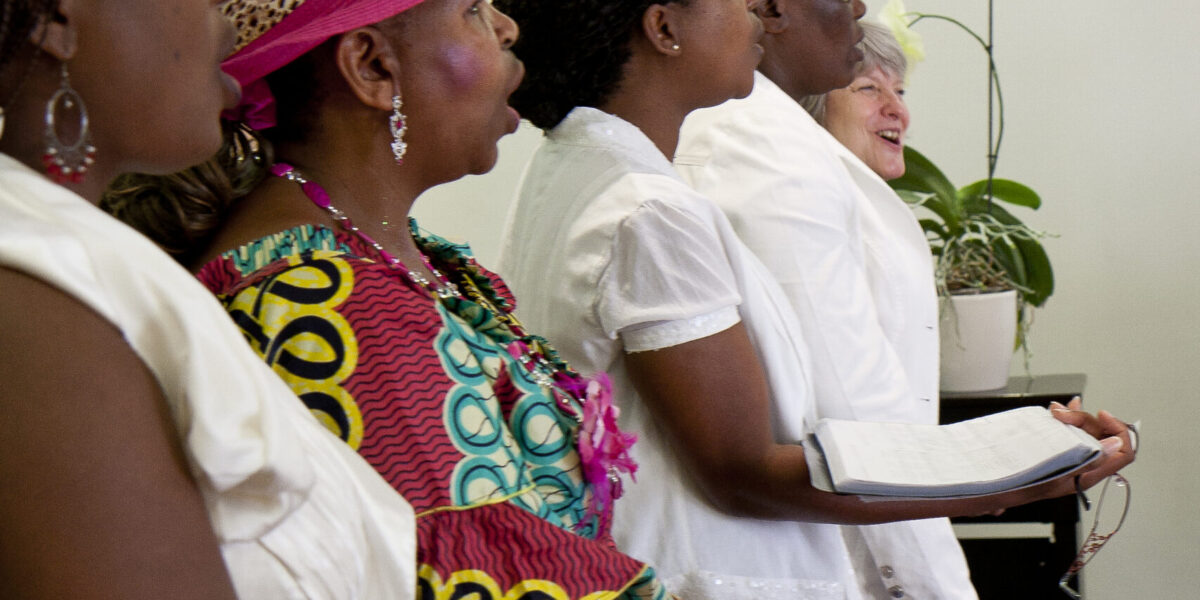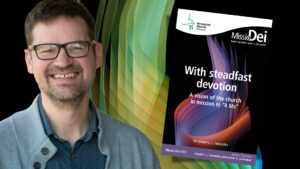PARIS, France (Mennonite Mission Network) — Two congregations in the suburbs of Paris, France, offer a foretaste of worship as described in Revelation where people from many nations gather around God’s throne with praises. Both congregations grew out of collaborative efforts between French Mennonites and predecessor agencies of Mennonite Mission Network.
Mennonite presence becomes visible in Paris
The first urban Mennonite church in France opened its doors in the 1950s in Châtenay-Malabry. Although founding members were almost exclusively from Western Europe, the congregation has since grown to include people of 12 different nationalities.
The second congregation, now located in Villeneuve le Comte, began 30 years later. It started out as a home for international students. Before becoming a church, the hostel provided temporary housing and fellowship for African students as well as North Americans and Europeans involved in the project. A meeting room in the basement allowed for large-group meals and in-depth discussions about politics, racism, and matters of faith. Festive occasions, global music, and storytelling helped to build bridges between cultures. For most of the participants, this was their first experience of talking about difficult issues with people from differing cultural backgrounds.
Welcome mat turned face down
When international students tried to attend French churches, they sometimes found the welcome mat turned face down. To create space for more inclusive fellowship, regular Sunday evening meals at the student hostel expanded to include Bible study, prayer, and sharing. Participants began to ask the question about becoming a church. However, the cultural and denominational origins of the participants raised some very complex questions. If the group was to become a church, what kind of church should it be? What about baptism? How should communion be celebrated? How should leadership be chosen?
Regular Sunday morning worship began in 1981. While retaining its multicultural identity, the student-hostel congregation welcomed native French people. This experience pointed indirectly to the blossoming of global Christianity, a phenomenon of which many Westerners were unaware. Christianity had been spreading in unforeseen proportions in Latin America, Asia and Africa, and immigration brought streams of these Christians to major urban centers in Europe.
Hundreds of immigrant churches began springing up in Paris. Due to significant changes in the ethnic make-up of the Châtenay neighborhood, this congregation was also becoming ethnically diverse.
Change brings tension, new understanding
With the changes came tension. One important key to reducing the tension was to purposefully choose leadership that reflected the makeup of the congregation. Both congregations now have half-time pastors along with multicultural leadership teams that work toward unity while reveling in their diversity.
The experience of worshiping with these two congregations has been positive and life-changing because:
• The diversity of worship styles and the richness of relationships help cross cultures.
• The Christian community helps people to learn to live in the wider context of
multicultural societies.
• Church members experience hospitality, solidarity, sharing, new kinds of friendships,
and affirmation of each person’s origins and culture.
• Such multicultural experience is the most obvious way to articulate a Mennonite peace and
justice theology in an urban context.
There are, of course, difficulties, misunderstandings, and never-ending challenges. Some of these include:
• Difficulty in dialogue across cultures can lead to a lack of encouragement for initiatives
people would like to take.
• Differing points of view can arise on ethical questions.
• Some conflicts can take longer to resolve because of cultural differences.
• Not singing or praying in one’s mother-tongue can inhibit spontaneity in worship.
• Without a common background, intimate friendships can be difficult. It’s harder to be
sensitive to the needs of people whom we don’t understand well.
• The temptation to gather in cultural groups when having meals or conversations can
resemble tribalism. People enjoy diversity, but they also like to be with those who resemble
themselves most closely.
Appreciation for multicultural congregations
“It is important that the church be multicultural,” said Patrick Monard of Martinique, who has been a member of the Villeneuve congregation for 23 years. “If the church is not capable of being an example of how people from different origins can live together in Christ, she is not being completely faithful to the mission that is hers.”
Tania Nussbaumer, who came from Ukraine, said that being part of the Châtenay congregation has changed her perception of the world.
“I now understand the biblical texts that describe the myriad of nations who glorify God together and can accept people as they are without taking into account their skin color or origin,” she said.
The part-time pastor of the Villeneuve congregation, Jean-Claude Girondin, summed up the experiences of these two multicultural Mennonite congregations well.
“The importance of a church including all peoples is at the heart of the gospel. At Pentecost, people heard the gospel in their own language, and the New Testament places a strong accent on the necessary diversity of Christian communities,” Girondin said.
Originally from Guadelupe, Girondin holds a doctoral degree in sociology and wrote his doctoral dissertation on immigrant churches in Paris. He believes that the multicultural church is an important element of the contextualization of the gospel in contemporary urban settings.
Hope and handles to address challenges
Historical, economic and political issues that complicate relations lie in the shadows of cultural differences. They require churches to rethink and seek creative ways of constructively confronting the real issues: colonial history and relationships, racism, the legacy of slavery, economic disparities, legal residential status or absence thereof, housing difficulties, unemployment, underemployment, and separated families.
Such problems often seem insurmountable. However, our experience in these two multicultural congregations gives us hope, as well as handles to address a wide range of these hard issues – a critical task that is progressing one step at a time.
Janie and Neal Blough, who have ministered in France for nearly four decades, serve on the staff of the Paris Mennonite Center. Janie offers adult English classes at the center and is a worship consultant and teacher. Neal lectures at theological schools, presents an Anabaptist perspective at conferences throughout Europe, and was named one of the 100 most influential Protestants in France by a Catholic weekly magazine. The Bloughs contribute to the leadership of the Châtenay congregation and serve as resource people in other French Mennonite congregations.
###
For immediate release
Mennonite Mission Network, the mission agency of Mennonite Church USA, leads, mobilizes and equips the church to participate in holistic witness to Jesus Christ in a broken world. Media may contact news@mennonitemission.net.







